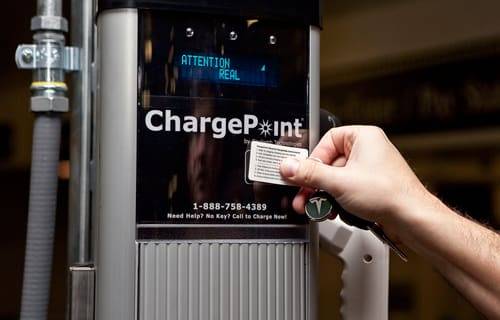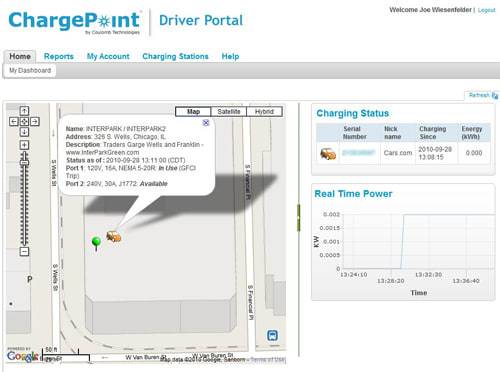Public Electric Car Charging: How You Pay


Related: Is Coast to Coast in an Electric Car Currently Viable?
We signed up for a ChargePoint account online, loading it with the minimum $25. Days later we received a ChargePass in the mail. It’s a bar-coded key tag ($9.95 apiece) that unlocks charging stations and identifies us to the network. In case you don’t get your pass right away or don’t have it on you, the Coulomb Technologies charger’s display provides a toll-free number you can call to get access. Some stations will support credit cards, too.
So, how does a consumer pay for electric charging? That will vary.
As described by Brian Levin, vice president of CarbonDay, our region’s Coulomb charging-station distributor, the hardware is purchased by the parking operator, municipality or what have you. The owner decides whether to provide the service gratis or to bill by the session or by the hour. Typical rates are $1 or $2 per hour, though a minimum might be required. The operator can also vary the rates by time of day. Once your electric vehicle is fully charged, the facility can stop billing, continue to bill you for tying up the charger or give you a time window in which to unplug and relocate the car.
How do you know the car is charged? If your car doesn’t support smartphone apps, email or text messages — as many are planned to — the ChargePoint network does. My dumbphone was of no use, so I configured our account’s preferences to send both text and email messages for all four possible alerts: when charging is complete, if a ground fault is detected, if the charger becomes disconnected or an over-current situation arises. As assigned, it alerted me via text and email within a minute when the charging attempt described yesterday failed. Pretty cool.

There are good reasons to leave an EV plugged in even if the battery is charged. Battery packs lose energy over time, especially if the car does any battery conditioning, such as cooling. Our Tesla hummed and gurgled when parked after driving, even when not plugged in. If the required power isn’t coming from the grid, it comes from the battery itself, costing you range. Likewise, in cold climates, some electric cars will warm the battery pack when plugged in, which ensures maximum capacity and range.
Even in the event of a successful session at a station, we wouldn’t have been billed because InterPark, which operates the parking structure across from our offices, has decided not to charge those who charge (if you will) for the rest of the year. You obviously still have to pay the daily or monthly parking fee just like every other car in the lot. Come 2011, they’ll revisit their payment strategy.
How much you pay per charge at a public station will determine the fuel cost advantage, if any, over a conventional internal combustion engine car. We know cost savings are all but guaranteed if you charge at home, but if you charge at 120 volts, you’re typically adding around five miles of range for the Tesla Roadster. In short, at 120 volts, $1 would buy you five miles. For a car that gets 30 mpg, one gallon of gas at $3 amounts to 10 miles per dollar; if the gas-powered car’s mileage or the cost of charging per hour are higher, the return is even worse. If you charge at 240 volts, it’s a better deal because you’re adding more range for the same amount of time.
So why don’t operators charge per kilowatt-hour? Levin says only electric utilities are allowed by law to do so, but that might change. The electricity cost isn’t the only issue, though: A charger attached to an EV isn’t available to another motorist, regardless of how much juice it’s drawing. The ChargePoint units can be programmed to end a session after a preset number of hours. Municipalities and parking operators will have to weigh one consideration versus the other. Ultimately, consumers will influence how rates and details are structured. “We think there will be a free market, and if three people on the block are charging $1-2 per hour and one guy is charging $5 per hour, it will correct itself,” Levin said.
Cars.com’s Editorial department is your source for automotive news and reviews. In line with Cars.com’s long-standing ethics policy, editors and reviewers don’t accept gifts or free trips from automakers. The Editorial department is independent of Cars.com’s advertising, sales and sponsored content departments.

Former Executive Editor Joe Wiesenfelder, a Cars.com launch veteran, led the car evaluation effort. He owns a 1984 Mercedes 300D and a 2002 Mazda Miata SE.
Featured stories




